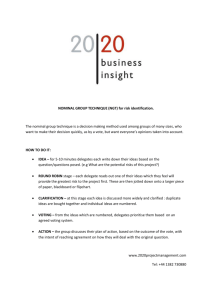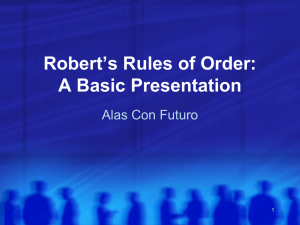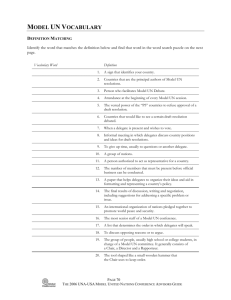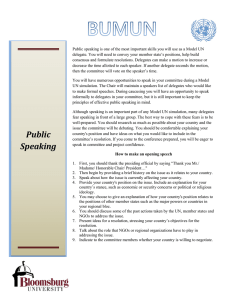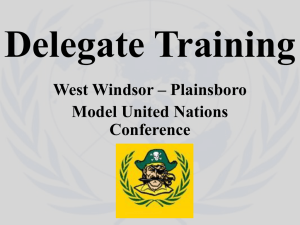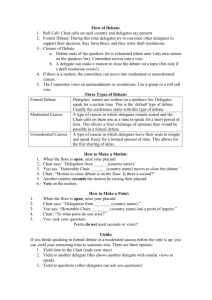Glossary
advertisement
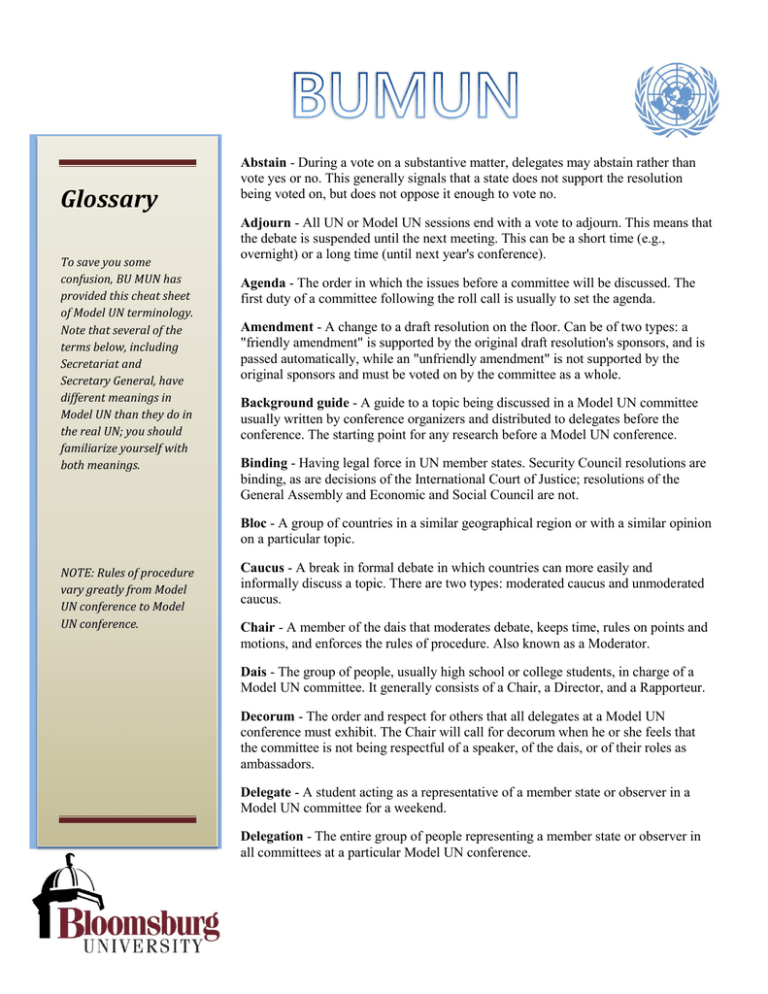
Glossary To save you some confusion, BU MUN has provided this cheat sheet of Model UN terminology. Note that several of the terms below, including Secretariat and Secretary General, have different meanings in Model UN than they do in the real UN; you should familiarize yourself with both meanings. Abstain - During a vote on a substantive matter, delegates may abstain rather than vote yes or no. This generally signals that a state does not support the resolution being voted on, but does not oppose it enough to vote no. Adjourn - All UN or Model UN sessions end with a vote to adjourn. This means that the debate is suspended until the next meeting. This can be a short time (e.g., overnight) or a long time (until next year's conference). Agenda - The order in which the issues before a committee will be discussed. The first duty of a committee following the roll call is usually to set the agenda. Amendment - A change to a draft resolution on the floor. Can be of two types: a "friendly amendment" is supported by the original draft resolution's sponsors, and is passed automatically, while an "unfriendly amendment" is not supported by the original sponsors and must be voted on by the committee as a whole. Background guide - A guide to a topic being discussed in a Model UN committee usually written by conference organizers and distributed to delegates before the conference. The starting point for any research before a Model UN conference. Binding - Having legal force in UN member states. Security Council resolutions are binding, as are decisions of the International Court of Justice; resolutions of the General Assembly and Economic and Social Council are not. Bloc - A group of countries in a similar geographical region or with a similar opinion on a particular topic. NOTE: Rules of procedure vary greatly from Model UN conference to Model UN conference. Caucus - A break in formal debate in which countries can more easily and informally discuss a topic. There are two types: moderated caucus and unmoderated caucus. Chair - A member of the dais that moderates debate, keeps time, rules on points and motions, and enforces the rules of procedure. Also known as a Moderator. Dais - The group of people, usually high school or college students, in charge of a Model UN committee. It generally consists of a Chair, a Director, and a Rapporteur. Decorum - The order and respect for others that all delegates at a Model UN conference must exhibit. The Chair will call for decorum when he or she feels that the committee is not being respectful of a speaker, of the dais, or of their roles as ambassadors. Delegate - A student acting as a representative of a member state or observer in a Model UN committee for a weekend. Delegation - The entire group of people representing a member state or observer in all committees at a particular Model UN conference. Director - A member of the dais that oversees the creation of working papers and draft resolutions, acts as an expert on the topic, makes sure delegates accurately reflect the policy of their countries, and ensures that decorum is maintained during caucuses. Division of the Question - During voting bloc, delegates may motion to vote on certain clauses of a resolution separately, so that only the clauses that are passed become part of the final resolution. This is known as division of the question. Draft resolution - A document that seeks to fix the problems addressed by a Model UN committee. If passed by the committee, the draft resolution will become into a resolution. Flow of debate - The order in which events proceed during a Model UN conference. Gavel - The tool, shaped like a small wooden hammer, that the Chair uses to keep order within a Model UN committee. Many conferences give the gavel used in a committee to the delegate recognized by the dais as the best in that committee; therefore, the term is frequently used to refer to the award given to the best delegate, even in cases where no actual gavel is given. Formal debate - The "standard" type of debate at a Model UN conference, in which delegates speak for a certain time in an order based on a speakers' list. Member State - A country that has ratified the Charter of the United Nations and whose application to join has been accepted by the General Assembly and Security Council. Currently, there are 191 member states. The only internationally recognized state that is not a member state is the Holy See. Moderated Caucus - A type of caucus in which delegates remain seated and the Chair calls on them one at a time to speak for a short period of time, enabling a freer exchange of opinions than would be possible in formal debate. Motion - A request made by a delegate that the committee as a whole do something. Some motions might be to go into a caucus, to adjourn, to introduce a draft resolution, or to move into voting bloc. Observer - A state, national organization, regional organization, or non-governmental organization that is not a member of the UN but participates in its debates. Observers can vote on procedural matters but not substantive matters. An example is the Holy See. On the floor - At a Model UN conference, when a working paper or draft resolution is first written, it may not be discussed in debate. After it is approved by the Director and introduced by the committee, it is put "on the floor" and may be discussed. Operative clause - The part of a resolution which describes how the UN will address a problem. It begins with an action verb (decides, establishes, recommends, etc.). Page - A delegate in a Model UN committee that has volunteered to pass notes from one delegate to another, or from a delegate to the dais, for a short period of time. Placard - A piece of cardstock with a country's name on it that a delegate raises in the air to signal to the Chair that he or she wishes to speak. Point - A request raised by a delegate for information or for an action relating to that delegate. Examples include a point of order, a point of inquiry, and a point of personal privilege Position paper - A summary of a country's position on a topic, written by a delegate before a Model UN conference. Perambulatory Clause - The part of a resolution that describes previous actions taken on the topic and reasons why the resolution is necessary. It begins with a participle or adjective (noting, concerned, regretting, aware of, recalling, etc.). Procedural - Having to do with the way a committee is run, as opposed to the topic being discussed. All delegates present must vote on procedural matters and may not abstain. Quorum - The minimum number of delegates needed to be present for a committee to meet. In the General Assembly, a quorum consists of one third of the members to begin debate, and a majority of members to pass a resolution. In the Security Council, no quorum exists for the body to debate, but nine members must be present to pass a resolution. Rapporteur - A member of the dais whose duties include keeping the speakers' list and taking the roll call. Resolution - A document that has been passed by an organ of the UN that aims to address a particular problem or issue. The UN equivalent of a law. Right of Reply - A right to speak in reply to a previous speaker's comment, invoked when a delegate feels personally insulted by another's speech. Generally requires a written note to the Chair to be invoked. Roll Call - The first order of business in a Model UN committee, during which the Rapporteur reads aloud the names of each member state in the committee. When a delegate's country's name is called, he or she may respond "present" or "present and voting." A delegate responding "present and voting" may not abstain on a substantive vote. Rules of Procedure - The rules by which a Model UN committee is run. Second - To agree with a motion being proposed. Many motions must be seconded before they can be brought to a vote. Secretariat - The most senior staff of a Model UN conference. Secretary General - The leader of a Model UN conference. Signatory - A country that wishes a draft resolution to be put on the floor and signs the draft resolution to accomplish this. A signatory need not support a resolution; it only wants it to be discussed. Usually, Model UN conferences require some minimum number of sponsors and signatories for a draft resolution to be approved. Simple majority - 50% plus one of the number of delegates in a committee. The amount needed to pass most votes. Speakers' List - A list that determines the order in which delegates will speak. Whenever a new topic is opened for discussion, the Chair will create a speakers' list by asking all delegates wishing to speak to raise their placards and calling on them one at a time. During debate, a delegate may indicate that he or she wishes to be added to the speakers' list by sending a note to the dais. Sponsor - One of the writers of a draft resolution. A friendly amendment can only be created if all sponsors agree. Substantive - Having to do with the topic being discussed. A substantive vote is a vote on a draft resolution or amendment already on the floor during voting bloc. Only member states (not observer states or non-governmental organizations) may vote on substantive issues. Unmoderated Caucus - A type of caucus in which delegates leave their seats to mingle and speak freely. Enables the free sharing of ideas to an extent not possible in formal debate or even a moderated caucus. Frequently used to sort countries into blocs and to write working papers and draft resolutions. Working Paper - A document in which the ideas of some delegates on how to resolve an issue are proposed. Frequently the precursor to a draft resolution. Veto - The ability, held by China, France, the Russian Federation, the United Kingdom, and the United States to prevent any draft resolution in the Security Council from passing by voting no. Vote - A time at which delegates indicate whether they do or do not support a proposed action for the committee. There are two types: procedural and substantive. Voting bloc - The period at the end of a committee session during which delegates vote on proposed amendments and draft resolutions. Nobody may enter or leave the room during voting bloc.
